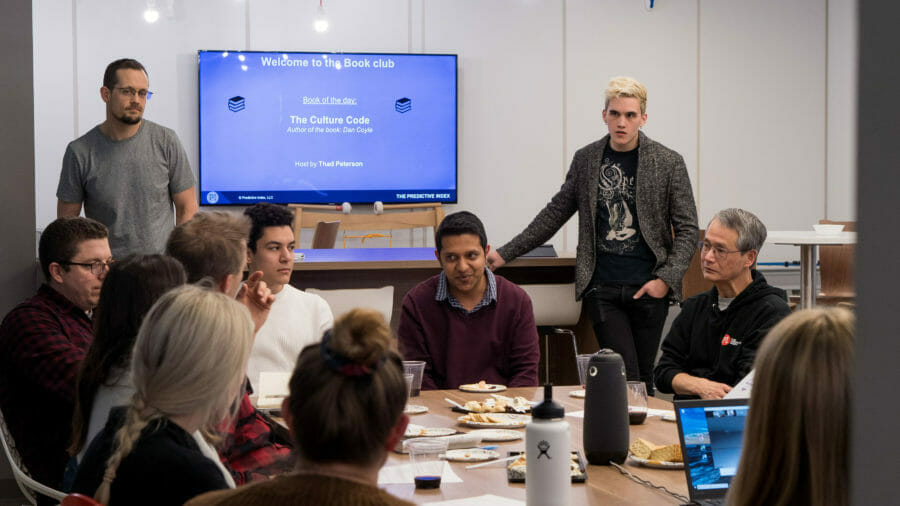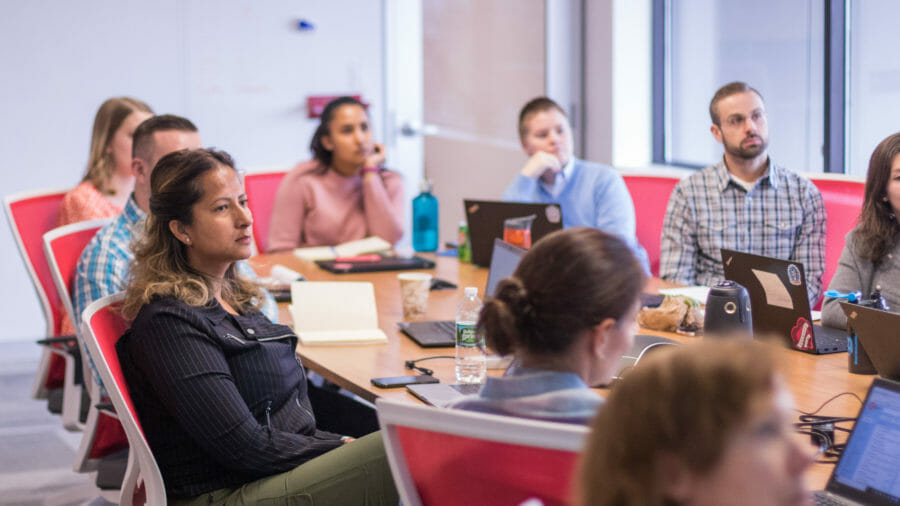Connor (Producer):
The following episode was recorded before the coronavirus pandemic, but we still thought the topics were useful and applicable today. Stay safe out there and we hope you enjoy.
Drew:
Hello and welcome to In Confidence: Face your workplace. A podcast that seeks to reveal the true blockers of confidence at work, on the job, with a boss, or in their career from real callers so they can face their workplace and achieve their goals. In most instances, the names, people and workplace information shared have likely been altered to protect the identity of those involved. We’re your hosts. I’m Drew Fortin.
Alyssa:
Hi there. This is Alyssa Dver, and I want to remind our listeners that every situation is different. So comments and tips that are shared on today’s call with our callers may vary with your own situations, but hopefully you’re going to find as helpful and we’re going to get right into this. This is a really interesting topic Drew. I want to bring on our wonderful caller today. Her name is Win. Win, welcome to In Confidence.
Drew:
Hi Win!
Win:
Well thank you for having me guys.
Alyssa:
Oh, we’re so glad. And I understand that you have a confidence issue, something around setting boundaries, but we certainly would like to know a little bit more detail what’s going on.
Win:
Well, because I have a physical disability, people in general think that because I am such a positive light and I can handle all that comes at me. People think, oh, when I talk to Win she can listen to me and give me advice and just feeling on, I can talk to her, no pun intended, but in confidence. And then she could give me advice. My problem is when people come up to me and still doing that, it makes me feel like they’re not respecting me or respecting my disability and the stuff I’m going through. I mean, we all have back and forth conversations day in, day out, but at the same time, because I’m a positive ray of light, I guess that I guess people in general, are trying to feed off my positive attitude. And how I deal with my disability and I’m done with people, not respecting people with disabilities.
Win:
I am done with people saying, how are you coping with a physical disability when they’re dumping every single little thing on me. And people who know me behind the scenes know this, that people won’t just because they think I can handle it. I happen to be retiring from the workplace setting some of the educational setting in May of 2020 and be a solo entrepreneur. And because of the situation I’m in now, I just feel like it’s easier to be me and not have people dump their baggage on me on top of me dealing with the disability and dealing with life.
Alyssa:
Mm, wow. Oh, Win I’m going to grab this for a second Drew, and the reason I want to grab it is because my son has a physical disability. Is yours a very visible disability?
Win:
Yes, it is. It’s cerebral palsy.
Alyssa:
Okay. So, you know, here’s the thing Win, and, and I hope that you know I never want to generalize. I never want to kind of apply my own experience or anyone’s one experience to somebody else. Cause we’re all unique and we have our own stuff, but I do. I recognize, and I tell this to my son is that everybody’s got a disability. We all have a disability. And the challenge is that when you have a visible one I think you hit it right on the head that people feel that you have a super power that you’ve overcome that. And so you must be able to handle even more disability in terms of emotional, this, that, and the other. And it is a blessing and a curse of course. But I want to ask you, you know, I’m hearing some frustration, a lot of frustration in your voice, and I want to kind of ask you very bluntly. Why is it so frustrating to you? Is it because you said you’re dealing with your own disability on top of it, but when somebody comes to you, what is making your confidence or your frustration really trigger?
Win:
Because they haven’t walked a day in my shoes enough so that when I zone out, when I trying to reflect on my next step, they will come up to me any time or place and still venting their frustrations on me and I am trying to zone out and reflect on my next step. And because I am considered the ray of hope, they somehow think that, Oh, because of Win’s challenges she could handle my challenges too. And tell me what to do. So it’s like a life coach situation.
Drew:
Sure. So, and I’m, I’m sorry that you feel that way Win I’m wondering, like tell us I think you answered a bit of Alyssa’s question. I still don’t, I’d love, maybe give us a specific, I’m trying to understand the root of what is actually making you frustrated?
Alyssa:
You mean they’re taking some of your refueling or is it time or is it…
Win:
It’s not time. It’s my refueling in a public place. They’re almost to the point of badgering me. They’re almost to the point. Because when I sit down at a public place, people will come up to me and say, it’s… I don’t the “Hi. How are you?” I mind the dumping of their problems. And so what I’m trying to do is still be the beacon of light, still be the beacon of hope, but at the same time, I don’t want people dumping their own problems on me.
Alyssa:
Okay. So let let’s, let’s go down a little bit where Drew was trying to take you. If you could, there’s a, there’s a trigger and all these behaviors that we don’t even sometimes realize that we are causing. So in other words, and I don’t mean it as a faulty thing, but sometimes we do things that invite people to behave in a certain way. And we have to, if we recognize them and we don’t stop doing them, then the people don’t behave in the way that we don’t want them to. So you sit down at a park bench, as you said, or you’re walking into a, an office environment walk us, explain to us how, like, this might happen to somebody, just walk up to you and be like, hi, my name is and, “Oh, I have a problem.” Like what, what typically transpires?
Win:
This happened with a really good friend of mine, and right. I had asked him as a friend, well, does this person do this to you too? And she said, yeah, the other time said, yeah. And I said, bingo that’s why. This person is now seeing life as four problems. And this happened to me in a public environment where this particular person came up to me and it’s still is dumping all her problems on me, the people around us. And because we live in a waiting room.If you want to dump your problems on me, pull me aside. You know that to pull me aside and tell me good news, bad news, wherever, but just don’t use me as the park bench and me as the beacon of light to make your problems better.
Drew:
That sounded very eloquent. What has prevented you from saying anything?
Win:
I have a loud, I have a loud mouth to begin with, and I get really much in trouble. And people know that I’m outspoken.
Alyssa:
Well, you know, I’m going to kind of flip us into little brainstorming at this point, because I think there’s a, maybe it’s very obvious. I could see Drew go like, “Oh yeah.” And I was like, “Oh yeah.” And you said it, you know, there is you have to empower yourself to empower other people. And so, and what I mean by that is by saying to somebody, “I don’t want to hear this now in any form of that,” that doesn’t fix the problem that it makes you upset. That gets them upset. Right? They want to be heard. They want you to hear them specifically because they trust you, I guess, or maybe just they can see and feel and know that you’re going to be somebody that can help them. Even if they don’t know who you are yet. That’s what I mean. It’s hard to trust somebody you don’t know yet, but you seem to have that aura, clearly. And that’s a blessing and it’s wonderful. But to be able to say some to somebody, I really want to hear your story, or I really want to hear your issue, but now is not the right time.
Win:
Okay.
Alyssa:
Can you say that? Can you say that out loud to us? Just practice it?
Win:
I will. I will.
Alyssa:
Say it.
Alyssa:
Just do it. Tell us right now. Oh, Win I have all these things, I want to tell you, Oh…
Drew:
Me first.
Alyssa:
Me first. You first Drew. Okay. Win, tell us.
Win:
Okay. I really want to hear your story, but now it’s not the right time.
Alyssa:
Perfect. Don’t you feel powerful?
Win:
Yup. Yup.
Alyssa:
I know. It’s hard. I believe me. I know it’s hard. You know, I Drew teases me all the time because coaching’s not one of my favorite things because you have to have the patience and the, Oh, you know, that little bit of you know, that patience thing, but empathy and time and all that, that I’m not particularly great at. But you know, I work really hard at it at the same time when people know that you’re a good coach, they want to tell you stuff all the time. Right? So I had to do that myself. But if you are willing to talk to them another time, that’s an easy line, isn’t it? Because you’re not blowing them off. You’re not telling them that you don’t want to hear it. You’re just saying, I want to hear it, but now is not a good time.
Win:
Yeah. Yeah.
Alyssa:
Yeah. You agree. Drew, what do you think?
Drew:
I think that’s great. This, this whole time, Win, I’ve been thinking about there’s probably…. I can understand why you’re frustrated. There, the other side of me is, you know, what were to happen if you were to walk into it, like go with it. What could transpire? And you know, people keep coming to you, is that a natural calling to do something with that? And, and in that case, is it possible that even what Alyssa said, I really want to hear your story, but now it’s not a good time. Is a fine way to say, let’s have that another time and give that person a card with your email on it and say, write me your story. Right? Like there’s probably a way to embrace it and walk into it. –
Alyssa:
Yeah. I, you know, I think we I shouldn’t say, I think, I know, I know this now for a fact, cause you know, all the coaching that I’ve done over the years and just my own journey and watching other people, you know, sometimes we fight what we’re naturally gifted to utilize. Right. And it sounds like you have this wonderful gift. You have to decide if it’s something you want to use or not.
Drew:
Right.
Alyssa:
And if you do want to use it then to take absolute superpower control over it in a way that says, this is what I’m going to do, and this is how I’m going to do it. But if you, if you say, you know what, I don’t want to hear it. Like I said to Drew, like, I don’t want to do coaching. It’s not my thing. I don’t, I don’t enjoy doing that.
Alyssa:
With some people, some people, I do, some people I don’t, I had to get really clear what that meant for me. And it made me feel very strong and I can help those people really well. I can help everyone if I’m feeling miserable. And it sounds like you’re miserable at times with, you know, all these people hitting you up. So I guess, you know, not to make, put you on the spot for a decision, but have there been times in the past where you were like, “Wow, I really helped that person.” And did it feel good? Is it something you want to do more of?
Win:
It is something I want to do more of. I just need to I just need to have the phone calls, all these emails privately with people, all these conversations privately. I don’t mind being the voice of the voiceless. People know this about me and that’s my tagline, the voice of the voiceless. And I don’t mind having people dump their problems on me. I just need to figure it out so I can sit with them in a way that I can hold sacred space for them.
Alyssa:
You know, I’m going to go on a limb a little bit here with you Win. I think your frustration is you really do want to help them, but they’re not giving you the time and space to do it well. So you’d be helping them as much as you’d be helping yourself by deferring the conversation where that time and space is much more accommodating.
Drew:
Right.
Win:
You hit the nail on the head, you hit, you hit the nail on the head. And it’s so funny because I, I want to help people. People just have to approach me at the right time and then and then we’ll be all good.
Alyssa:
Yeah! So make it the right time. Take control. Drew, do you want to take us to kind of our, where we’re like, we’re on the edge here for action.
Drew:
Yeah. I mean, I think you have, you have a few things when I’m even to close this out, I think what Alyssa said with your statement, I really want to hear your story, but now it’s not a good time. You know, one of the things that you could potentially do is I want to hear your story. In fact, I get energized by hearing other people’s stories and helping them. And I’d love to talk to you about that sometime, right? As a, as, as a way to do that, but you’ve heard we’ve had quite the conversation today. So what’s one thing that you think you’re going to take away from this conversation and that you want to try?
Win:
I want to help people, but do it my own doing in my own way. And I want people to use the phone and call me and I want them… They can meet me in person. I don’t care. But I want them to know that I’m still here to help them. I just need, I just need it to be done on my own time.
Drew:
There you go. Love that.
Alyssa:
My friend, my new friend, I hope. And I say friend, not to everybody, but you have something to offer to people. Please bring it to the world, but do it in a way that you can feel good about it because that goodness is going to just transcend. So thank you so much for calling.
Drew:
Thank you, Win!
Win:
Thank you guys.
Drew:
Well, that was interesting.
Alyssa:
And I will say I got a couple of goosebumps at the end knowing that like, I think it was like that hatch that open for her. And I think she can really use it.
Drew:
Totally different person from the beginning of the call.
Alyssa:
Great, great. That’s what, that’s what it’s all about, man. And she’s got a lot to offer, so hopefully she’ll take it and run.
Drew:
Do it, Win.
Connor (Producer):
Thanks for listening. Consider applying to be a caller, to hear the answers to your questions and help other listeners in the process. You can find out how to apply it in the show notes of this episode. Also, if you found this content useful, consider telling just one friend who you think would like it. We’d really love your help, spreading the word. Thanks so much.




